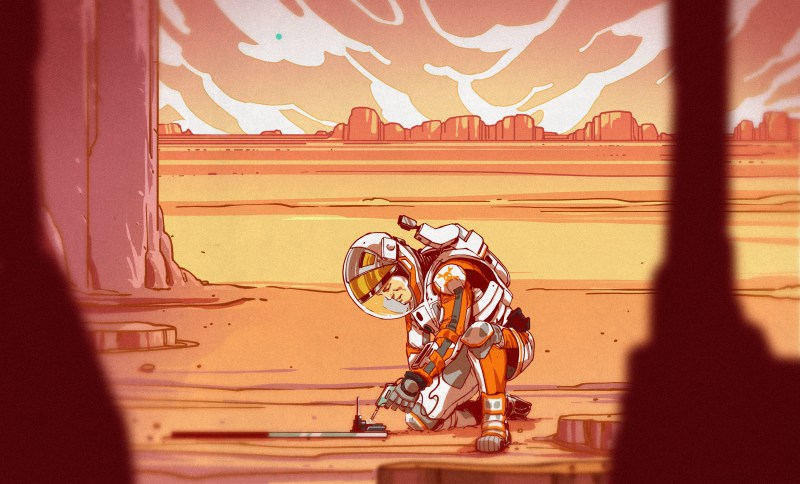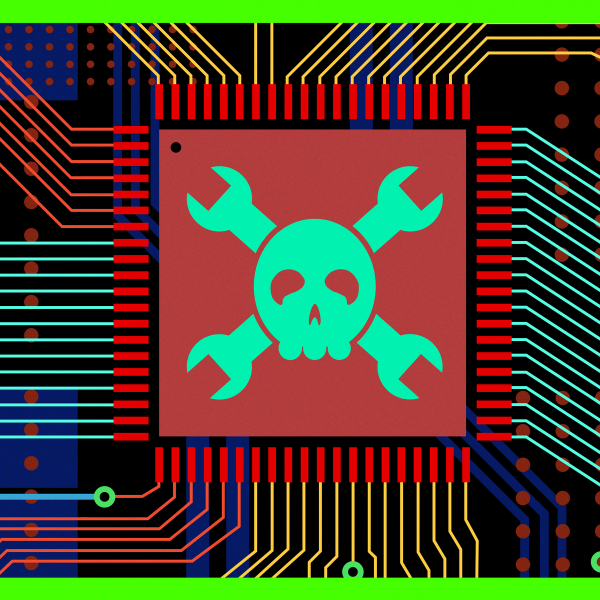How is it possible that there’s a geek culture? I mean, it’s one thing to assume that all folks of a nerdy enough bent will know a little Ohm’s law, can fake their way through enough quantum mechanics to at least be interesting at a cocktail party, and might even have a favorite mnemonic for the resistor colors or the angles involved in sine, cosine, and tangents. But how is it that we all know the answer to life, the universe, and everything?
Mike and I were podcasting a couple of weeks back, and it came out that he’d never played Starcraft. I was aghast! Especially since he’s into video games in general, to have not played the seminal 3-way-without-being-rock-scissors-paper game! My mind boggled. But then again, there was a time in my life when I hadn’t actually read all of Dune or Cryptonomicon, which would have left Mike’s jaw on the floor.
 Whether you prefer Star Trek or Star Wars, the Matrix or the Hobbit, it’s even more surprising that we have so much in common! And thinking about it, I’m pretty sure that exactly our interchange is the reason — it’s a word of mouth culture thing. Some folks at the hackerspace are talking about Cthulu, and chances are you’re going to be reading some Lovecraft. An argument about the plausibility of the hacks in The Martian has sent at least a couple of geeks to the cinema or the library. And so it goes.
Whether you prefer Star Trek or Star Wars, the Matrix or the Hobbit, it’s even more surprising that we have so much in common! And thinking about it, I’m pretty sure that exactly our interchange is the reason — it’s a word of mouth culture thing. Some folks at the hackerspace are talking about Cthulu, and chances are you’re going to be reading some Lovecraft. An argument about the plausibility of the hacks in The Martian has sent at least a couple of geeks to the cinema or the library. And so it goes.
So do your part! Share your geek-culture recommendations with us all in the comments. If you were stranded on a desert island, with a decent bookshelf and maybe even a streaming video service, what’s on your top-10 list? What do you still need to see, read, or hear?
















BOFH is a must:
Here’s #1 https://groups.google.com/g/alt.tasteless/c/W9u1mvR78LA
I don’t get how there can be so much overlap between hacking/making and video game playing.
Don’t get me wrong, I do like both. I do enjoy it on the rare occasion I play a video game. But the “real gamers” put so much time into it. I feel like I can never get enough time for my hacker/maker hobby as it is. If I ever really got into gaming that would be the end of it. So I don’t.
For those of you that do both… how? Where do you get the time? I don’t mean to be rude but do you have jobs, families, friends? Do you eat and sleep? I’m usually cutting my sleep and still can’t find enough time.
It’s called…retirement.
What was the mnemonic about the elements in order of decreasing chemical activity? Something like Please Charlie Send Me Some Zebras In Long Hog Crates Marked Striped, Printed Goods? High school was a very long time ago …
No mention of The Bobiverse yet? Blimey
Or Expeditionary force. Right then, I will have to do something about that…….HOLD MY BEER!
In addition to all the other excellent works mentioned, my list would also contain the books by Ursula LeGuin, beginning with:
The Dispossessed
Rocannon’s World
Planet of Exile
Love this thread, bookmarked it and have to investigate more of it.
What I haven’t seen so far:
The Mars trilogy by Kim Stanley Robinson.
Best sci-fi by my standards. Future tech is involved, but based in reality and no warpmagic etc.
Good thinking, of what could be done in a few years. Stuff that lets you dream.
(if you can ignore the ignorance of the author towards everything involved with economic)
Ian Banks – Culture Novels
My recommendation: Constellation Games by Leonard RIchardson. It’s a relatively new book, it’s a first contact story, but the aliens are not aggressive brutes or aloof out of touch “pure energy beings”. The aliens are an anarchist collective of anthropologists and librarians basically. The world still needs saving obviously, but the causes are much more subtle and realistic then “Earth needs to be destroyed for a hyperspace bypass” or “We need your planet for it’s resources”.
It’s got heaps of big idea’s and plenty of charm.
Imagine that you are a sci-fi writer, that lives in a country with censorship. The censorship does not allow to publish anything that could make fun of the coverment and comunism or socialism in general.
What can you do?
Well… you can write great novels about distopian worlds which are suprisingly similar to your communstiic reality.
And what censors do about that? Nothing, because scif-fi is for kids – not worth reading :)
This is the story of Andrzej Zajdel (https://en.wikipedia.org/wiki/Janusz_Zajdel)
I really recommend reading his novels such as Limes Inferior or Van Troff’s Cylinder
You will be suprised how good it is!
Thanks, guys, for quadrupling my already too long reading list. In addition to all of those above I thought these deserve another or a first call out. Some are dated but then so am I.
Sagan, A Demon-Haunted World
Pohl, Chernobyl
Rich, Skunk Works
Dawkins, The Ancestors Tale
Doctorow, Little Brother
Kahneman, Thinking Fast and Slow
Taleb, The Black Swan
Taleb, Fooled By Randomness
Ingrassia and White, Comeback
Sobel, Longitude
Norman, Design of Everyday Things
Tufte, The Visual Display of Quantitative Information
Tung, Topics in Mathematical Modeling
Hoffman, The Man Who Loved Only Numbers
Strogatz, The Joy of X
Casti, Searcing for Certainty
I wonder how many of these touchstones are limited by language — Joshua above brought up Perry Rhodan, and Jules Verne and some anime have shown up, but the vast majority are works written in English, and that’s where the references come from when we’re establishing our geekiness. What are the can’t-miss ones we’re just, well, missing?
I know as an anime fan I’m occasionally brought up short by some of their references — not even to elements of the broader Japanese culture, but to their own established geek culture tropes. In a US-made property, if you want two characters to do a “Freaky Friday” bodyswap, you need to establish a McGuffin — maybe get a mad scientist’s machine, or a magic spell, or have the two say the same wish at the same time; in Japanese media, just bang their heads together, or have them fall down some stairs. Why? Some manga did it in the 1960s (probably one by Osamu Tezuka), so it’s established. Any magic or technology that makes people change ages will invariably take the form of candies (the blue one makes you older, the red one makes you younger) after Tezuka’s “Marvelous Melmo”.
Yeah!
The problem, I guess, is just what gets translated. By and large, European geeks all read/speak English as a second language, so they have much less trouble approaching English literature. While German geeks read Hitchhikers in English, American geeks are shut out of Perry Rhodan by lack of translation. That’s too bad.
A lot of computer language geeks are also human language geeks, so there’s bound to be some crossover. Still, I wouldn’t learn Polish just to read Stanislaw Lem, but that doesn’t mean I wouldn’t wish that I could. :) (And he’s well translated into English anyway… but you get what I mean.)
The internationalism of geek culture is a great topic though.
The multiverse of writer /musician Michael Moorcock awesome writer! The Cornelius Quartet, Dancers
At The End Of Time and the The Elric saga are worth the read. He wrote lyrics for and jammed with Hawkwind and Blue Oyster Cult among many other achievements.
Clearly I’m not geeky enough, as far as I am concerned TV shows are nothing bit a bit of light entertainment. I don’t care about the intricacies of the plot or characters. They are fiction, it is just a waste of valuable space to store fictional information. Same at school, I never read fiction books or played D&D I’d much rather pick up a book from the factual section and learn something new.
If you have not read the Hyperion Cantos (all 4 books) in the past, and do not read it immediately (Audiobooks are acceptable, the ones on Audible are superb quality), I will come to your house and hurt you.
It’s less of a crime to skip it, but I would still warmly recommend Carrion Comfort. It’s not strictly SciFi, it’s mind-control horror, but it’s *wonderful, like fantastic, like insane*.
https://en.wikipedia.org/wiki/Hyperion_Cantos
https://en.wikipedia.org/wiki/Carrion_Comfort
Oh, going through Wikipedia I realized «Remember Siri» isn’t included directly in the Cantos books themselves.
So if (I mean *WHEN*, you have no option here) you read the Cantos, do not miss «Remember Siri» once you’re done.
«Orphans of the Helix», same story.
If you have not read the Hyperion Cantos (all 4 books) in the past, and do not read it immediately (Audiobooks are acceptable, the ones on Audible are superb quality), I will come to your house and hurt you.
It’s less of a crime to skip it, but I would still warmly recommend Carrion Comfort. It’s not strictly SciFi, it’s mind-control horror, but it’s *wonderful, like fantastic, like insane*.
Wikipedia:
Hyperion_Cantos
Carrion_Comfort
Oh, going through Wikipedia I realized «Remember Siri» isn’t included directly in the Cantos books themselves.
So if (I mean *WHEN*, you have no option here) you read the Cantos, do not miss «Remember Siri» once you’re done.
«Orphans of the Helix», same story.
From Philip .K.Dick:
Valis, A scanner darkly, Ubik, guaranted mind-benders.
Valis is about AI and is insane.
The Divine Invasion I think is in the same universe/continuity, and is probably even better I think. Yahweh is literally a character in there.
The man in the high castle is a fun time, but even though it’s better than most sci-fi you’ll ever read, it’s not nearly as good as the others I’m mentioning here. That’s how good they are.
If you are going to read only one of the books I’m going to mention, PLEASE read «The Cosmic Puppets».
I read that book when I was 11.
It changed my life.
I *started learning English, so I could read the original version* starting at 12. It was *that* impactful.
COSMIC
PUPPETS
Don’t read the back of the book. Don’t look at the cover. Don’t read the Wikipedia page/synopsis.
Read the thing.
You *will not* regret it.
https://en.wikipedia.org/wiki/The_Cosmic_Puppets
I promise you, you will thank me. Guaranteed.
No one ever mentions Dragon’s Egg by Robert L. Forward and it’s so good! I mean, until I read it, I had never imagined of the possibilities of life on a star, let alone harvesting energy from it or inventing math and religion out of necessity. It was the very first book a fellow geek shared more than three decades ago. Some concepts might have aged not-so-good but the main theme holds. Highly recommended.
Very, very late to this party, but: ROBERT L. FORWARD!
Dragon’s Egg is HARD science fiction, orbiting a neutron star, written by a phd in physics! Genuine page-turner.
Starquake is the sequel. Not as good as the first, but at least 90% as good.